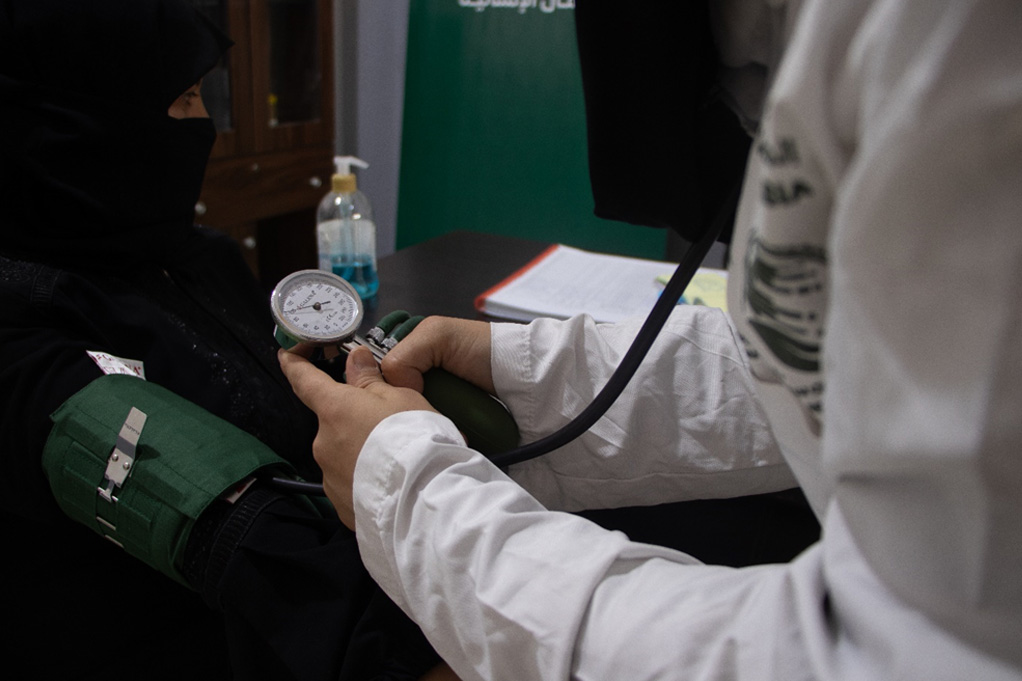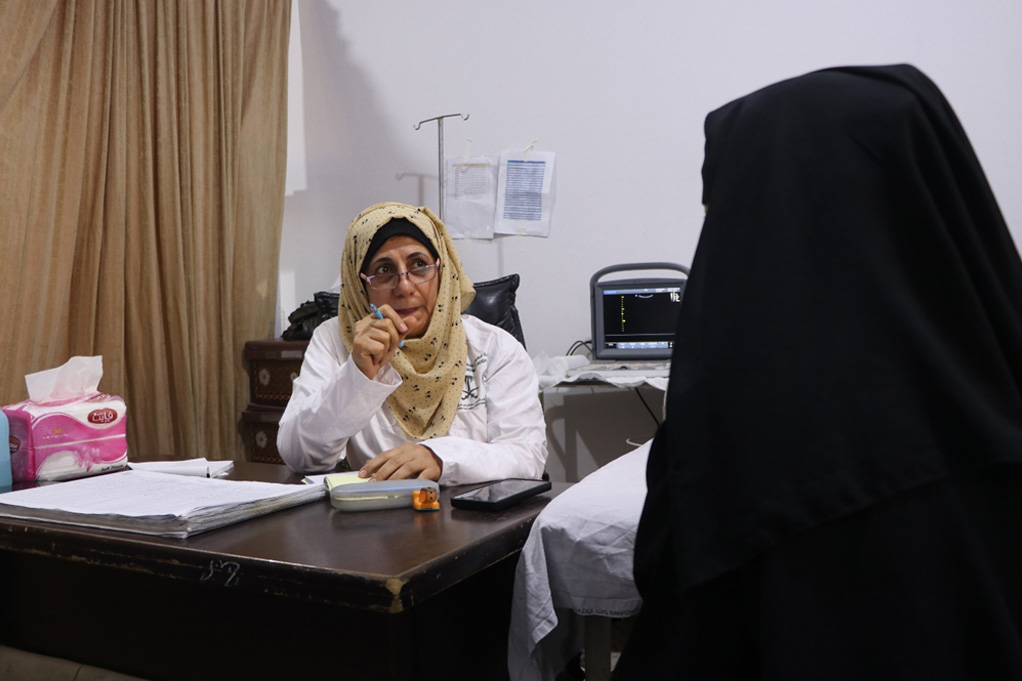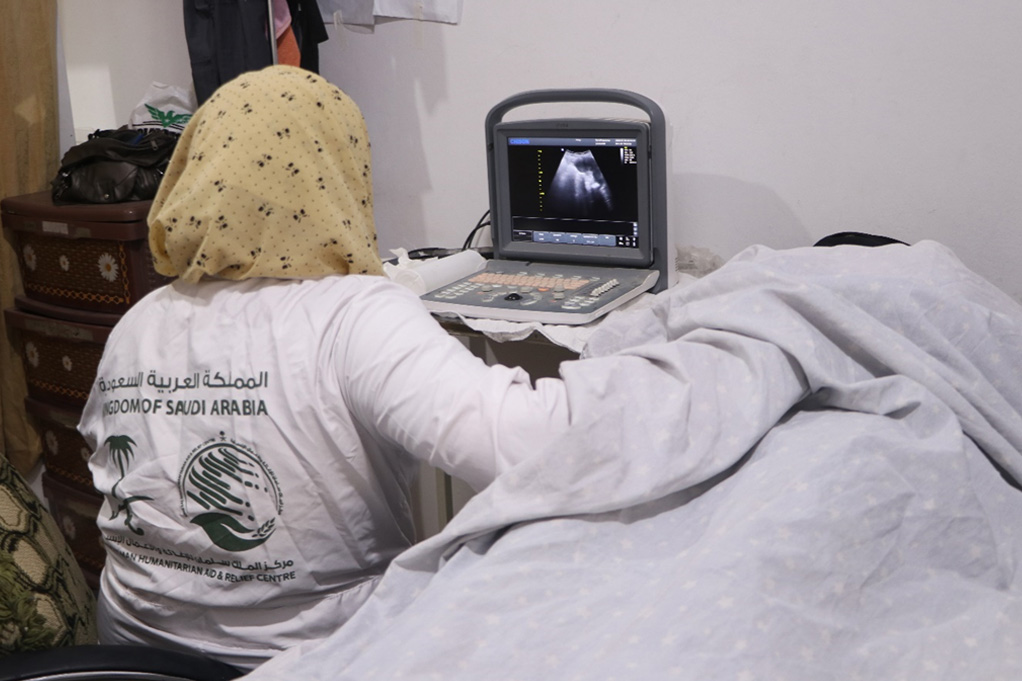Women in Aleppo find care and dignity through local health centres
 Midwife Maram Ali Al-Hassan checks the blood pressure of Hamida Ammar Raslan during a consultation at Sundi Health Centre. Photo credit: WHO25 September 2025, Aleppo, Syrian Arab Republic – At Sundi Health Centre in rural Aleppo, 36-year-old Hamida Ammar Raslan sits in the waiting area, clutching her referral slip. She has long struggled with gynaecological infections, but access to treatment was once out of reach.
Midwife Maram Ali Al-Hassan checks the blood pressure of Hamida Ammar Raslan during a consultation at Sundi Health Centre. Photo credit: WHO25 September 2025, Aleppo, Syrian Arab Republic – At Sundi Health Centre in rural Aleppo, 36-year-old Hamida Ammar Raslan sits in the waiting area, clutching her referral slip. She has long struggled with gynaecological infections, but access to treatment was once out of reach.
“Before, I did not know where I could find help,” she recalls softly. “Now the clinic is close, the treatment is available, and the midwife explains everything clearly. I feel safe.”
Hamida was examined by midwife Maram Ali Al-Hassan and prescribed treatment the same day. For her, this simple service means restored health – and the ability to care for her children with peace of mind.
Keeping clinics operational
 Midwife Rawnak Abdoun advices Malak Al-Sharqat during a consultation at Al-Bab Health Centre. Photo credit: WHOAcross northern Aleppo, health centres like Sundi, Ihtimlat, and Al-Bab are lifelines for women and families. With support from the King Salman Humanitarian Aid and Relief Centre (KSrelief), WHO has kept 50 health facilities operational since November 2024, ensuring access to primary, secondary, and specialised care.
Midwife Rawnak Abdoun advices Malak Al-Sharqat during a consultation at Al-Bab Health Centre. Photo credit: WHOAcross northern Aleppo, health centres like Sundi, Ihtimlat, and Al-Bab are lifelines for women and families. With support from the King Salman Humanitarian Aid and Relief Centre (KSrelief), WHO has kept 50 health facilities operational since November 2024, ensuring access to primary, secondary, and specialised care.
In this time, around 565,000 people have benefitted from healthcare, over 935,000 consultations have been delivered, and 28,000 referrals made for emergency and advanced treatment. A remarkable 97% of patients report satisfaction with the quality of care.
At Ihtimlat Health Centre, 42-year-old Khadija Hamo shares a similar story. She sought help for persistent gynaecological problems. “I was embarrassed to speak about my illness,” she admits. “But midwife Asia Muslim made me feel respected. She gave me advice and medicine that worked.”
Strengthening women’s health
 Dr Aziza Al-Naasan consults with Zubaida Abdulrahman Al-Matar at Al-Bab Health Centre. Photo credit: WHOGynaecology services are among the most in-demand in Aleppo’s communities, where years of conflict have disrupted routine healthcare for women. Keeping these services available is critical not only to health, but also to dignity.
Dr Aziza Al-Naasan consults with Zubaida Abdulrahman Al-Matar at Al-Bab Health Centre. Photo credit: WHOGynaecology services are among the most in-demand in Aleppo’s communities, where years of conflict have disrupted routine healthcare for women. Keeping these services available is critical not only to health, but also to dignity.
“Many women come here with untreated infections or complications,” says midwife Wafaa Al-Doush at Al-Bab Health Centre. “We also support family planning, helping women make informed choices about their health. Without this clinic, they would have nowhere to go.”
For 28-year-old Halima Mohammad Al-Ahmad, family planning advice from Wafaa has been transformative. “I want to raise my children well, without fear of falling sick again,” she says.
Integrated care for the whole community
 Midwife Rawnak Abdoun conducts an ultrasound examination at KSrelief supported Al-Bab Health Centre. Photo credit: WHOAt the same Al-Bab facility, gynaecology sits alongside general services, meaning families can seek care together. On a recent morning, 55-year-old Zubaida Abdulrahman Al-Matar arrived exhausted, with high blood sugar and fatigue.
Midwife Rawnak Abdoun conducts an ultrasound examination at KSrelief supported Al-Bab Health Centre. Photo credit: WHOAt the same Al-Bab facility, gynaecology sits alongside general services, meaning families can seek care together. On a recent morning, 55-year-old Zubaida Abdulrahman Al-Matar arrived exhausted, with high blood sugar and fatigue.
“Dr Aziza Al-Naasan explained my condition and gave me treatment to manage it,” Zubaida explains. “Now I know how to take care of myself and my family.”
Midwife Rawnak Abdoun adds that women often come late, after months of discomfort. “When they leave with treatment and reassurance, you can see the relief on their faces,” she says. “That is why we continue, despite the challenges.”
Sustaining essential services
KSrelief’s contribution has been central to this continuity of care – from medicines and supplies to dialysis services, which remain a growing need in the region. For patients like Hamida, Khadija, Halima, Zubaida, and Malak, these services mean more than medicine – they represent hope, stability, and dignity after years of disruption.








